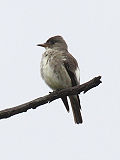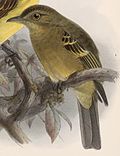Superregnum: Eukaryota
Cladus: Unikonta
Cladus: Opisthokonta
Cladus: Holozoa
Regnum: Animalia
Subregnum: Eumetazoa
Cladus: Bilateria
Cladus: Nephrozoa
Superphylum: Deuterostomia
Phylum: Chordata
Subphylum: Vertebrata
Infraphylum: Gnathostomata
Megaclassis: Osteichthyes
Cladus: Sarcopterygii
Cladus: Rhipidistia
Cladus: Tetrapodomorpha
Cladus: Eotetrapodiformes
Cladus: Elpistostegalia
Superclassis: Tetrapoda
Cladus: Reptiliomorpha
Cladus: Amniota
Classis: Reptilia
Cladus: Eureptilia
Cladus: Romeriida
Subclassis: Diapsida
Cladus: Sauria
Infraclassis: Archosauromorpha
Cladus: Crurotarsi
Cladus: Archosauria
Cladus: Avemetatarsalia
Cladus: Ornithodira
Cladus: Dinosauromorpha
Cladus: Dinosauriformes
Cladus: Dracohors
Cladus: Dinosauria
Cladus: Saurischia
Cladus: Eusaurischia
Subordo: Theropoda
Cladus: Neotheropoda
Cladus: Averostra
Cladus: Tetanurae
Cladus: Avetheropoda
Cladus: Coelurosauria
Cladus: Tyrannoraptora
Cladus: Maniraptoromorpha
Cladus: Maniraptoriformes
Cladus: Maniraptora
Cladus: Pennaraptora
Cladus: Paraves
Cladus: Eumaniraptora
Cladus: Avialae
Classis/Infraclassis: Aves
Cladus: Avebrevicauda
Cladus: Pygostylia
Cladus: Ornithothoraces
Cladus: Ornithuromorpha
Cladus: Carinatae
Subclassis/Parvclassis: Neornithes
Infraclassis/Cohors: Neognathae
Cladus: Neoaves
Cladus: Telluraves
Cladus: Australaves
Ordo: Passeriformes
Subordo: Tyranni
Infraordo: Tyrannides
Parvordo: Tyrannida
Familia: Tyrannidae
Genus: Contopus
Species: C. albogularis – C. bogotensis – C. caribaeus – C. cinereus – C. cooperi – C. fumigatus – C. hispaniolensis – C. latirostris – C. lugubris – C. nigrescens – C. ochraceus – C. pallidus – C. pertinax – C. punensis – C. sordidulus – C. virens
Name
Contopus Cabanis, 1855
Typus: Muscicapa virens Linnaeus, 1766 = Contopus virens
Synonyms
Syrichta Bonaparte, 1854 Ann.Sci.Nat., Zool. p. 133 BHL
Blacicus Cabanis, 1855 J.Orn. p. 480 BHL
Planchesia Bonaparte, 1857 Bull.Soc.Linn.Normandie p. 36 BHL
Myiochanes Cabanis & Heine, 1860 Mus.Hein p. 7 BHL
Nuttallornis Ridgway, 1887 Man.N.Am.Birds p.337 BHL
Horizopus Oberholser, 1899 15935576 Auk p. 331}}
Contopes [variation]
Conchopus [variation]
References
Primary references
Cabanis, J. 1855. In: Dr. J.Gundlach's Beiträge zur Ornithologie Cuba's. Nach Mittheilungen des Reisenden an Hr. Bez.– Dir. Sezekorn in Cassel; von Letzterem zusammengestellt. Mit Zusätzen und Anmerkungen geordnet vom Herausgeber. Journal für Ornithologie 3(18): 465–480. DOI: 10.1007/bf02009761 BHLReference page. p. 479
Additional references
Harvey, M.G, Bravo, G.A., Claramunt, S, Cuervo, A.M., Derryberry, G.E., Battilana, J., Seeholzer, G.F., McKay, J.S., O’Meara, B.C., Faircloth, B.C., Edwards, S.V., Pérez-Emán, J.L., Moyle, R.G., Sheldon, F.H., Aleixo, A., Smith, B.T., Chesser, R.T., Silveira, L.F., Cracraft, J., Brumfield, R.T. & Derryberry, E.P. 2020. The evolution of a tropical biodiversity hotspot. Science 370 no.6522: 1343–1348. DOI: 10.1126/science.aaz6970 Reference page.
Vernacular names
English: Pewee
español: Pibíes
français: Contopus
lietuvių: Piviai
português: Piuís
The pewees are a genus, Contopus, of small to medium-sized insect-eating birds in the Tyrant flycatcher family Tyrannidae.
These birds are known as pewees, from the call of one of the more common members of this vocal group. They are generally charcoal-grey birds with wing bars that live in wooded areas.
The genus Contopus was introduced by the German ornithologist Jean Cabanis in 1855 with the eastern wood pewee as the type species.[1] The name of the genus combines the Ancient Greek words kontos "pole" or "shaft" and pous "foot".[2]
The genus contains 16 species:[3]
| Image | Scientific name | Common Name | Distribution |
|---|---|---|---|
 |
Contopus cooperi | Olive-sided flycatcher | Canada, Alaska and the northeastern and western United States |
 |
Contopus pertinax | Greater pewee | central and southern Mexico south through Costa Rica and Nicaragua |
 |
Contopus lugubris | Dark pewee | Talamancan montane forests of Costa Rica and western Panama. |
 |
Contopus fumigatus | Smoke-colored pewee | Argentina, Bolivia, Brazil, Colombia, Ecuador, Guyana, Peru, and Venezuela |
 |
Contopus ochraceus | Ochraceous pewee | Costa Rica and western Panama |
 |
Contopus sordidulus | Western wood pewee | western North America |
 |
Contopus virens | Eastern wood pewee | Central America and in the Andes region of northern South America. |
 |
Contopus cinereus | Southern tropical pewee | southern Brazil and Paraguay south to Argentina. |
 |
Contopus bogotensis | Northern tropical pewee | southeastern Mexico to northern South America from northern Colombia to northeastern Brazil. |
 |
Contopus punensis | Tumbes pewee | western Ecuador and western Peru. |
 |
Contopus albogularis | White-throated pewee | Brazil, French Guiana, and Suriname. |
 |
Contopus nigrescens | Blackish pewee | Brazil, Ecuador, Guyana, and Peru. |
 |
Contopus caribaeus | Cuban pewee | Cuba and the northern Bahamas. |
 |
Contopus hispaniolensis | Hispaniolan pewee | island of Hispaniola in the Caribbean. |
 |
Contopus pallidus | Jamaican pewee | Jamaica |
 |
Contopus latirostris | Lesser Antillean pewee | Dominica, Guadeloupe, Martinique, Puerto Rico, and Saint Lucia |
References
Cabanis, Jean (1855). "Contopus virens Cab". Journal für Ornithologie (in German). 3 (18): 479.
Jobling, J.A. (2018). del Hoyo, J.; Elliott, A.; Sargatal, J.; Christie, D.A.; de Juana, E. (eds.). "Key to Scientific Names in Ornithology". Handbook of the Birds of the World Alive. Lynx Edicions. Retrieved 1 July 2018.
Gill, Frank; Donsker, David, eds. (2018). "Tyrant flycatchers". World Bird List Version 8.2. International Ornithologists' Union. Retrieved 1 July 2018.
Retrieved from "http://en.wikipedia.org/"
All text is available under the terms of the GNU Free Documentation License

